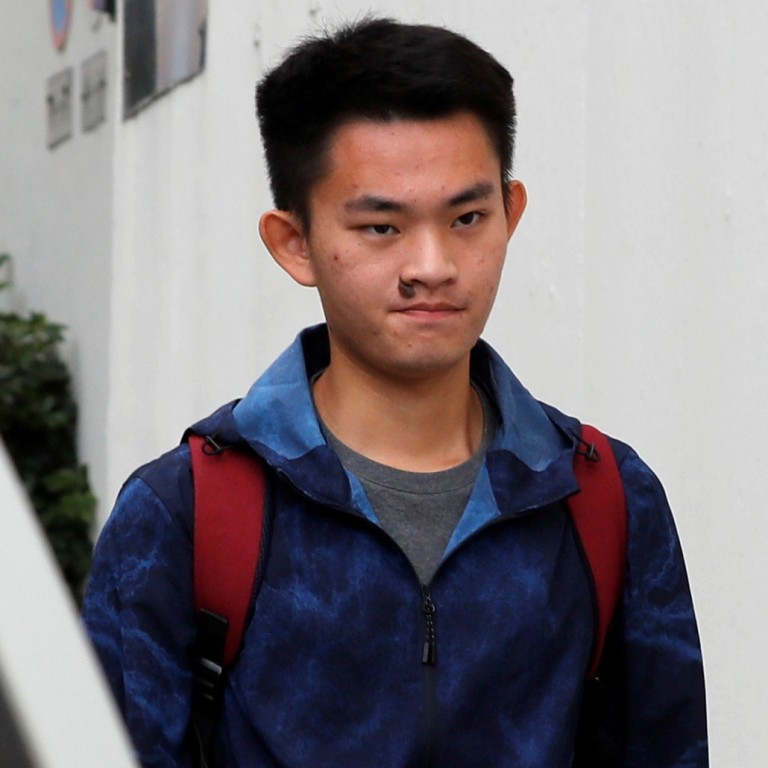
Why a dispute over a Hong Kong murder suspect is giving Taiwan’s President Tsai Ing-wen an election edge
- The row over Chan Tong-kai’s case is amplifying the ruling party’s position as an upholder of the island’s ‘sovereignty’, analysts say
- But Tsai ‘will need more than the furore’ to win next year’s presidential race
The governments of Taiwan and Hong Kong have clashed over the next step in prosecuting Chan, a 20-year-old Hong Kong resident who admitted killing his pregnant girlfriend in Taiwan last year.
Each side accuses the other of politicising the case, with Taipei refusing Chan’s offer to surrender himself over fears it would affirm Beijing’s position that Taiwan is not a separate jurisdiction from mainland China.
The Hong Kong government, which is semi-autonomous from Beijing, has urged Taipei to accept Chan’s voluntary surrender, but Taiwanese officials have insisted that he can only be extradited under a formal mutual legal assistance framework.
Observers say that Taiwanese President Tsai Ing-wen is using the dispute to show her independence-leaning Democratic Progressive Party (DPP) as “torch-bearers of sovereignty” for the island, while the mainland-friendly opposition Kuomintang (KMT) party has argued that the ruling government is putting politics over justice.
The case comes as the self-ruled island prepares to go to the polls in January, with Tsai’s administration accusing Beijing of trying to isolate Taiwan internationally to support KMT candidate Han Kuo-yu.
Taiwan has been self-ruled since 1949 but Beijing considers the island part of the country that must eventually be reunited with the mainland “by force if necessary”.
Taiwan rejects murder suspect’s surrender offer, says Hong Kong must comply with ‘legal procedures’
Cross-strait tensions have mounted since Tsai came into office in 2016 and refused to accept the 1992 consensus, an understanding that there is only “one China” – something that Beijing considers a prerequisite for any talks with Taipei.
Tsai has also taken a strong stand against the “one country, two systems”, the model of governance that Beijing proposes for Taiwan.
Chen Ping-kuei, an assistant professor at Taipei’s National Chengchi University, said politics played a part in Taipei’s every move in the Chan case because the DPP seized any chance to win voters with a strong show in defence of Taiwan.
“What the Taiwan government wants now is formal recognition of its legitimacy to conspicuously show its sovereignty,” he said. “Both parties, the DPP and the KMT, will both treat this issue as a stage to clearly show their respective directions on cross-strait relations, which are entirely different.”
The Chan case was one of the main justifications for Hong Kong’s controversial extradition bill, a proposal that would have allowed extradition of criminal suspects on a case-by-case basis to places the city does not have an extradition treaty with, including mainland China, Taiwan and Macau.
The bill, formally withdrawn on Wednesday, prompted more than four months of protests in Hong Kong, over what demonstrators saw as an attempt by Beijing to erode the city’s freedoms. Those protests have since developed into calls for greater democracy and rejection of Beijing’s involvement in the city’s affairs.
In Taiwan, the tensions in Hong Kong had played into the election campaign, giving the DPP a boost, observers said.
This Hong Kong situation has made the Taiwan public more on alert about the mainland and the threat from Beijing
Han and the island’s former KMT president, Ma Ying-jeou, have criticised Tsai for “politicising” the issue and not wanting justice for the victim’s family.
“We are talking about someone who is willing to surrender himself and can come back to Taiwan to face trial, and ensure that justice is achieved,” Ma said. “I really hope that the Taiwanese authorities will not complicate a simple issue, and will not exploit politics to achieve something at the expense of justice.”
Chen said that if the Chan case continued to make headlines in Taiwan it would benefit the DPP.
“This Hong Kong situation has made the Taiwan public more on alert about the mainland and the threat from Beijing,” he said.
Hong Kong murder suspect who triggered protest crisis released from jail, issues public apology
Gunter Schubert, director of the European Research Centre on Contemporary Taiwan at the Eberhard Karls University of Tübingen, said that by requesting a mutual legal assistance framework rather than allowing Chan to arrive on the island informally, Taiwan likely wanted to institutionalise its relationship with Hong Kong and Beijing.
Schubert also said that without a clear position on the Hong Kong issue the KMT had struggled to win support for their cross-strait policies.
“[The KMT] know that they can’t sell the 1992 consensus to the Taiwan public any more because even though that is basic KMT policy, you will not win an election with that consensus,” he said.
Voters will decide their votes based on developments in Taiwan, meaning Tsai’s policies on cross-strait relations and also on the economy over the past three years
Yu Keli, former director of the Institute of Taiwan Studies at the Chinese Academy of Social Sciences in Beijing, said that ultimately Tsai would not be able to win the election just on the furore over the Chan case and the Hong Kong protests.
“Voters will decide their votes based on developments in Taiwan, meaning Tsai’s policies on cross-strait relations and also on the economy over the past three years,” Yu said. “If Tsai keeps her position on this case, it could backfire because people in Taiwan also want to see justice done.”
Chan allegedly murdered his girlfriend, Poon Hiu-wing, in February 2018 during a holiday in Taiwan, before returning to Hong Kong alone. He later confessed to Hong Kong police that he killed Poon, but authorities could only charge him on money laundering, for which he sentenced to 29 months in a Hong Kong prison. Chan was released in Hong Kong on Wednesday morning.


